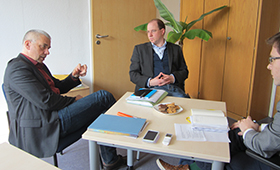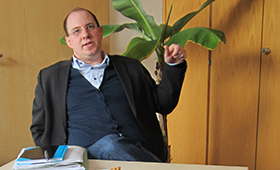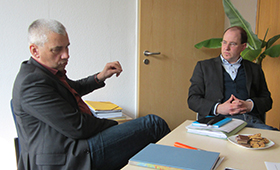The Digitalisation of the World of Work – Consequences for Vocational Education and Training
Interview with Dr. Gert Zink and Torben Padur
14.04.2015
The German Federal Institute for Vocational Education and Training (BIBB) is currently strengthening efforts towards the issue of the digitalisation of the world of work. For the first time ever, the BIBB is executing a project together with Volkswagen which aims to gather information on the development of the professions. The project will begin on 1 April 2015. Alongside this project, the BIBB is addressing the fundamental question as to whether and how the digitalisation of the world of work will change vocational education and training. Our editor Thomas Schmitz discussed the topic with the responsible experts at BIBB, Dr. Gert Zinke and Torben Padur.

Schmitz: Dr. Zinke, Mr Padur: I am delighted that you have both taken the time to discuss the subject of Industry 4.0 with us. Your project with Volkswagen begins in early April. How did this collaboration come about and what will it be addressing?
Padur: There were discussions between VW and our institute's management during the 2014 BIBB Congress. As a result, we determined that we should be putting our ideas together. VW would like to arrange its training occupations more efficiently and is examining which opportunities for flexibility are currently available for this purpose in order to meet the exact demands of the industrial sector.

On the other hand, a joint project gives us the chance to be in close contact with a big player. This will allow us to acquire reliable information from experience and go directly into the work processes. For us, the most important question is what impact will digitalisation have on jobs, qualifications, existing occupations and existing structural models? We hope to be able to derive specific recommendations on how to proceed with the further development of training occupations. That is the rough outline of our 18-month project “The Digitalisation of the World of Work”. It's also important that the project only represents one facet of what the BIBB is working on. We want to include other stakeholders from politics, practice and academia in this project and the discussion of the targeted interim results during an expert conference to be held while the project is running.
Zinke: This is also a win-win situation, of course. It is only through dialogue with companies that we will succeed, firstly in recognising early on the altered requirements we face in the qualification of skilled labour which provide us with stimulus on a regulatory level. Secondly, our expertise allows us to support the companies, in particular those responsible for vocational training, when it comes to developing vocational education and training further. It is a challenge for companies that there are certain things in vocational education and training that used to be good but will no longer be sufficient in the next ten or fifteen years. The way in which the training is configured must change here, somewhat. A very good example for this is the training occupation “mechatronics engineer”. Lots of companies begin with the vice in their practical training for this occupation. But shouldn't we be starting with the mechatronics component of the training straight away, so that problem-solving and thinking in terms of mechatronics systems is developed from the very beginning? That would be sensible, in my opinion.
Industry 4.0 is another level up from mechanics, electrotechnics and IT. IT is no longer just integrated into one facility; it connects an entire system. The result is a cyber physical system – a system which links virtual and real components, starting with production planning and proceeding to sale, turnover and customer service. So I can trace a part which was fitted into a car years ago back to the time at which it was produced, the shift during which the part was produced and therefore see where and when any errors occurred. Production and service processes will change, and with them the work assignments and opportunities for skilled labour to intervene. This should be part of the thinking in the professions. I must approach the terms of reference differently.
Padur: We haven't just set up the VW project which is being supervised by Mr Zinke and myself. We also have a team of experts under the management of the president, Prof. Esser, in which representatives from all departments are involved.
Industry 4.0 at the BIBB: A team of experts with representatives from all areas is dealing with the topic. The VW project is a part of this.
For example, in one department, Industry 4.0 scenarios are calculated in the context of the question as to what impact increasing digitalisation will have on the labour and training market. We also have the international department on board and the BIBB has achieved a considerable amount in the area of digital learning aids over a number of years now. There are a great many different channels which we are currently still trying to systematise and occupy. VW is part of this whole challenge.
Schmitz: Lots of professions face huge challenges in Industry 4.0. Will these professions also be more closely linked to one another? Transversal skills such as process control or the ability to have an overview of the entire life cycle of a product are often in demand.
Zinke: At the moment, it's hard to say what impact the developments will have on the professions and the skilled labour numbers employed in the sectors. We have determined, for example, that there is less and less skilled labour on site at the final assembly stage of bodywork with highly automated systems. And it is possible that these few employees make up an initially joint training profile. This may be the mechatronics engineer who, according to statements from company representatives, are not numerous enough in the system support sector. Then we have the system operators who are responsible for the permanent production process. This may result in new, key processions. There are sure to be purely mechanical or metal-working professions in the future, but they will not be encountered in these systems. They will rather be found in the production of individual components or special engineering or plant manufacturing. On the one hand, these are developments which we must keep an eye on and align the training occupations towards as soon as possible, but on the other, training occupations must remain valid in the long term and not be updated every two to three years or so.
Schmitz: What will happen after the project? I assume that an analysis phase will follow before the findings are integrated into the rearrangement of the professions?
Zinke: We will close the project with a final report and then the results will be seen. They will provide additional support in the case for any rearrangement procedure. I hope that the interval between the completion of the project with VW and “We have to take care of these professions” will not be too great. But it's not just about the rearrangement procedures; training within the existing professions must also be redesigned in the companies. This is also a signal which should come out of the “digitalisation of the world of work” project. The companies and vocational colleges must ask themselves whether they are still providing the proper training in view of the developments we are facing? Vocational education and training must be designed to secure the ability to work for decades, where possible. Both vocational colleges and companies must doubtlessly continue to learn.
Schmitz: The Federal Ministry of Education and Research published a press release on 16 March for the start of the new “Plattform Industrie 4.0”. Where does your project fit in with this? Is it still being ascertained?
Zinke: We are not yet directly associated with this initiative but I would like to make contact. We are definitely interested. The VW project is an individual initiative for now. As the BIBB we must of course be active in other occupational fields when it comes to the digitalisation of the world of work and not just the automotive industry, but in the construction industry, the chemical industry, the paper-processing industry and the logistics sector, for example.
“Giving new drive to the issue of the 'digitalisation of the world of work' and vocational education and training.”
I believe, if we do it as prominently as we are with VW, that we can take a step towards giving new drive to the issue of the “digitalisation of the world of work” and also “vocational education and training”. This is about the viability of the system, because we do not believe that greater requirements automatically demand academisation or higher qualifications, but that we can achieve this very well with vocational qualifications.
Schmitz: There are lots of small and medium-sized companies in the skilled trades. If you look at the media, you get the impression that they are not being addressed much by Industry 4.0. Why is that?
Zinke: The skilled trades need to start thinking in particular about how their own future will look within the framework of a digitalised world. I think a lot has been done in some areas in this respect.
Padur: When we consider that we are mainly expecting growth in the service sector as a result of “digitalisation”, then it is surely the small, innovative and well-placed companies that can occupy a niche in this area. This is surely a chance for more training positions, for example. It's always more difficult for a small company than it is for a large group with a large budget. But the question is still what direction are we going in and are there any opportunities to take action? Besides large companies like VW, it is important for us to keep in mind the impact on small and medium-sized companies, because this is where the majority of dual vocational education and training takes place.
Zinke: But that doesn't just mean skilled trade companies, but also the startups which are appearing. These are often companies which tend to think in short-term projects and have no affinity to vocational education and training, which is a problem. This results in a situation which is contributing to the decline in the proportion of companies providing training. Although something is growing, it is not in a way which means it automatically becomes a company which provides training.

Schmitz: If I've understood you correctly, then it can be said that there is a demand for creativity in the skilled trades in particular and that one has to come up with ideas to profit from the digitalisation of the world of work. Many a master craftsman might say: “That doesn't bother me. I'll just continue as before.” How would you respond to that?
Zinke: If you drive through Germany you will find areas with a large number of roof solar panels or a large number of security systems, for example in the well-off Lake Constance region. The skilled trades will grow or fail with commissions for systems such as these. If the skilled trades do not provide a certain service, the clients will find their service providers elsewhere. I think there are regional differences to be seen here from which we can learn.
The area of “Smart Homes” is appearing in the skilled trades.
Padur: You can see in the example “plumbing, heating, climate” that the area is also appearing in the skilled trades, for example the “Smart Homes” area, which means operating the heating or other facilities in your own home from anywhere, for example. In the current rearrangement procedure, it is emerging that there will be a component of two weeks called “facility management systems” integrated into training regulation in future, so very low-threshold in the beginning.
Schmitz: Will “Training Centres 4.0” be required in future so that people from various areas can come together?
Zinke: Here's an example: For some years, we have been discussing the issue of a mechatronics engineer for wind farms. I do not consider the profession to be necessary, but there would be an opportunity to set up specialist classes or focus schools on a federal or federal state level which address the subject, for example a school for wind energy in Schleswig-Holstein, and the teaching staff would have the opportunity to receive guidance and the corresponding equipment. Then we would have an absolutely positive impact. Why shouldn't there be focus classes underway in Wolfsburg, Stuttgart or Munich with Industry 4.0 and mechatronic engineering?
Schmitz: Dr. Zinke, Mr Padur: many thanks for the discussion.